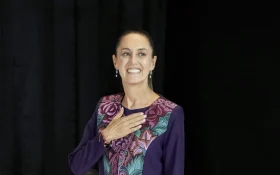In a historic moment for Mexico, a woman — Claudia Sheinbaum — has captured the presidency, becoming the nation’s first female leader in its over 200 years of independence. The 61-year-old former Mexico City mayor and outspoken socialist emerged victorious in Sunday’s election by promising continuity with her predecessor, Andrés Manuel López Obrador.
While closely aligning herself politically with the outgoing president and sharing his views on using government spending to fix poverty, Sheinbaum is seen as a softer personality who could take a less combative approach.
“I believe in science,” Sheinbaum, told The Associated Press last year. This was evident during her mayoral tenure, when Mexico City took a different coronavirus pandemic response than Mexico’s national strategy.
As COVID-19 raged, Sheinbaum expanded testing despite the federal government downplaying it, implemented business restrictions despite economic concerns from López Obrador, and publicly wore masks.
Mexico’s rampant violence now looms as one of Sheinbaum’s biggest immediate challenges after taking office October 1st. She has vowed to expand the National Guard but focus on “addressing the causes” over hardline crackdowns.
“Let it be clear, it doesn’t mean an iron fist, wars or authoritarianism,” Sheinbaum stated. “We will promote a strategy of addressing the causes and continue moving toward zero impunity.”
The president-elect has largely praised López Obrador’s agenda, blaming “neoliberal” policies for poverty while championing a strong welfare state and Mexico’s state oil company Pemex. However, she has also emphasized clean energy.
“For me, being from the left has to do with that, with guaranteeing the minimum rights to all residents,” Sheinbaum explained her ideology.
Sheinbaum’s low-key style contrasts with López Obrador’s penchant for combative public battles against other branches of government and media.
“It appears she’s going to go in a different direction…I don’t know how much,” said political scientist Ivonne Acuña Murillo.
